- May 2019
-
annotatingausten.sfsuenglishdh.net annotatingausten.sfsuenglishdh.net
-
dissipation.
"Wasteful expenditure or consumption of money, means, powers, faculties, etc.; squandering, waste" (OED).
-
plantation
"An area planted with trees, esp. for commercial purposes" (OED).
-
- Feb 2019
-
canmore.org.uk canmore.org.uk
-
slighted to clear access to the drove way
Might mean slighting in the sense of straightforward demolition
-
-
static1.squarespace.com static1.squarespace.com
-
imbibed
def: absorb or assimilate (ideas or knowledge) or it could mean def: drink (alcohol) Why is it that every writer is somehow connected to drinking?
-
-
static1.squarespace.com static1.squarespace.com
-
Encomium
def :a speech or piece of writing that praises someone or something highly.
-
Censure
Censure vs. censor...
Express severe disapproval of vs. suppress what is deemed unacceptable....
She frequently uses one and not the other.
-
-
static1.squarespace.com static1.squarespace.com
-
desideratum
def: something that is needed or wanted.
-
-
static1.squarespace.com static1.squarespace.com
-
cognizance
def: knowledge, awareness, or notice.
-
-
static1.squarespace.com static1.squarespace.com
-
sagacity
def: the quality of being sagacious Sagacious Def: having or showing keen mental discernment and good judgment; shrewd.
-
ephemeral
def: lasting for a very short time
-
-
www.ribbonfarm.com www.ribbonfarm.com
-
Shannon entropy
information content
-
Kolmogorov-Chaitin complexity
descriptive complexity
-
- Jan 2019
-
static1.squarespace.com static1.squarespace.com
-
elides
def: omit (a sound or syllable) when speaking.
-
recalcitrance
: the state of being recalcitrant def of recalcitrant: obstinately defiant of authority or restraint
-
-
static1.squarespace.com static1.squarespace.com
-
atripartite
Interesting word choice in my opinion. Def: shared by or involving three parties.
Additionally used in Theology as to describe humankind having three part: Body, Spirit, and Soul.
-
-
static1.squarespace.com static1.squarespace.com
-
rhizomic
A philosophical concept developed by Gilles Deleuze and Félix Guattari in their Capitalism and Schizophrenia (1972–1980) project.
-
-
static1.squarespace.com static1.squarespace.com
-
abjection
Literally means "the state of being cast off" https://en.wikipedia.org/wiki/Abjection
-
hallenges distinctions between subjectivitie
Another good way to articulate the mission of posthumanism--challenging distinctions between subjectivities (the arbitrary, "man-made" [?] characteristics we assign to human and nonhuman categories).
-
-
static1.squarespace.com static1.squarespace.com
-
we can cite ample precedent to refute any particularclaim as well
this seems to go hand-in-hand with what Professor Rivers said last week in our discussions. There are many ways to define rhetoric, but each definition is also cutting it out and saying what it is not
-
-
static1.squarespace.com static1.squarespace.com
-
semiotic
adj: relating to signs and symbols
-
shamanic
Shamanism is a practice that involves a practitioner reaching altered states of consciousness in order to perceive and interact with what they believe to be a spirit world and channel these transcendental energies into this world. https://en.wikipedia.org/wiki/Shamanism
-
winnow
(of the wind) blow
-
-
static1.squarespace.com static1.squarespace.com
-
positive-feedback system
A positive-feedback system is a system in which the output is enhanced when a stimulus is received.
The best example that is used in most science classes at SLU is childbirth. Oxytocin is released when a child places pressure on the cervix for the first time triggering contractions. As the child begins to crown and places more pressure on the cervix, additional oxytocin is released. This triggers even more contractions and eventually the child is born. I apologize for the gross explanation, but it is the best one to explain what the system is.
-
infra dig
From the Latin phrase infra dignitatem meaning beneath one; demeaning. First used by Sir Walter Scott in his 1825 novel Redgauntlet
-
isonwrphi
isomorphic: "being of identical or similar form, shape, or structure"
-
- May 2018
-
annotatingausten.sfsuenglishdh.net annotatingausten.sfsuenglishdh.net
-
phaeton
"A type of light four-wheeled open carriage, usually drawn by a pair of horses, and having one or two seats facing forward" (OED).
 Image of a light phaeton (Two Nerdy History Girls).
Image of a light phaeton (Two Nerdy History Girls). -
gig
"A light two-wheeled one-horse carriage" (OED).

Image of a Standhope-style gig (Wikipedia).
-
fish
“A small flat piece of bone or ivory used instead of money or for keeping account in games of chance; sometimes made in the form of a fish” (OED).
Fish made from ivory (Austenonly.com):

Other shapes, made of mother-of-pearl (Austenonly.com):

-
screen
"Used to shield people from the heat of a fireplace….Also used to keep sparks off the floor" (Pool, What Jane Austen Ate…, 308).
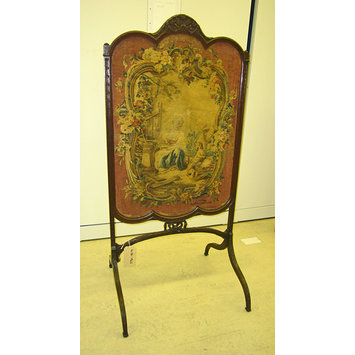
Picture of a fire screen from 1788 (Victoria and Albert Museum).
-
-
annotatingausten.sfsuenglishdh.net annotatingausten.sfsuenglishdh.net
-
Mr. Darcy may, perhaps, have heard of such a place as Gracechurch Street, but he would hardly think a month’s ablution enough to cleanse him from its impurities, were he once to enter it
Ablution is defined as, Frequently humorous (with mock formal tone). The action or an act of washing oneself; personal cleansing; bathing" (OED)
-
At his own ball he offended two or three young ladies by not asking them to dance; and I spoke to him twice myself without receiving an answer. Could there be finer symptoms?
After describing Mr. Bingley's love as "violent", Elizabeth explains how much he loved Jane, such as declining other ladies and not replying to Elizabeth, which she suggests are fine "symptoms". What is unique is that she now uses "symptoms" to describe his behavior and many people associate this word as having a negative connotation. This term is defined as, "A phenomenon or circumstance accompanying some condition, process, feeling, etc., and serving as evidence of it (orig. and properly of something evil); a sign or indication of something" (OED)
-
“But that expression of ‘violently in love’ is so hackneyed, so doubtful, so indefinite, that it gives me very little idea. It is as often applied to feelings which arise from an half-hour’s acquaintance, as to a real, strong attachment. Pray, how violent was Mr. Bingley’s love?”
The use of the word "violent" is very interesting when describing Mr. Bingley's love. This word is defined as, "By or with great force, strength, or vigour; with a violent motion or action; so as to produce a violent or powerful effect" (OED). This definition shows that his love for her is really intense, showing that he's deeply in love with her. Instead of saying that he is deeply in love with Jane, the use of "violent" works in this context because he does end up hurting her emotionally. This is a play on words used by Austen on purpose. With this being said, Mrs. Gardiner states that the phrase is "hackneyed" which defines as "To overuse or make too familiar; (hence) to make trite, banal, or uninteresting, esp. through indiscriminate use" (OED), which again plays with how Mr. Bingley hurt Jane. Both definitions show that Mrs. Gardiner is not fully convinced of Mr. Bingley loving Jane, that it seems fake.
-
- Apr 2018
-
annotatingausten.sfsuenglishdh.net annotatingausten.sfsuenglishdh.net
-
clever
"possessing skill or talent" (OED).
-
ductility
"capability of being easily led or influenced" (OED).
-
censuring
"to form or give an opinion; to judge, pass judgment on" (OED).
-
character
"The sum of the moral and mental qualities which distinguish an individual" (OED).
-
good-breeding
"Good manners and courteous behavior resulting from a good upbringing esp. among the upper classes" (OED).
-
handsome
"Of a thing: having an attractive form or appearance; well-proportioned; elegant, stylish." (OED)
Austen uses "handsome" to describe beauty in the male and female sense
-
trade
Trade - The practice of making one's living in business, as opposed to in a profession or from unearned income. (OED)
-
three-and-twenty years
three and twenty years = 23
This number references the 23 years they had been married.
-
let
When Mrs .Bennet says Netherfield is "let" she means someone is renting the estate.
-
unassailed
"not attacked; not assaulted" (Johnson).
-
mayoralty
Mayoralty - the office of mayor
Sir William Lucas was mayor of Meryton
-
-
annotatingausten.sfsuenglishdh.net annotatingausten.sfsuenglishdh.net
-
intermarriage
"Marriage between members of different families, castes, tribes, nations, or societies, as establishing a connection between such families, etc." (OED).
-
coming out
"Emerge; become known." (OED).
-
sensible
"Done or chosen in accordance with wisdom or prudence; likely to be of benefit." (OED).
-
disapprobation
"Strong disapproval, typically on moral grounds." (OED).
-
patroness
"A person who gives financial or other support to a person, organization, or cause." (OED).
-
ladyship’s
"A respectful form of reference or address to a woman who has a title." (OED).
-
countenance
"A person's face or facial expression." (OED).
-
hot-pressed paper
"paper which has been pressed between heated metal plates or rollers during manufacture to flatten and smooth the surface" (OED).
-
-
annotatingausten.sfsuenglishdh.net annotatingausten.sfsuenglishdh.net
-
piquet
"A trick-taking card game for two players, using a 32-card pack consisting of the seven to the ace only" (OED).
-
estimable
"worthy of great respect" (OED).
-
panegyric
"A public speech or published text in praise of someone or something" (OED).
-
alacrity
"Brisk and cheerful readiness" (OED).
-
avenue
"The chief approach to a country-house, usually bordered by trees; hence, any broad roadway bordered or marked by trees or other objects at regular intervals. Sometimes used of the trees alone, with tacit disregard of the road they overshadow" (OED).
-
decorum
"That which is proper, suitable, seemly, befitting, becoming; fitness, propriety, congruity." (OED)
-
the dining-parlour
"A room used for dining or eating supper. Now rare." (OED)
-
Vingt-un
“A round game of cards in which the object is to make the number twenty-one or as near this as possible without exceeding it, by counting the pips on the cards, court-cards counting as ten, the ace one or eleven as the holder chooses”(OED).
-
archly
“In an arch manner; cleverly, waggishly; with good-humoured slyness or sauciness”(OED).
-
capital
“Prominent; important, significant; particular”(OED).
-
superciliousness
“The quality or character of being supercilious; haughty contemptuousness or superiority” (OED).
-
petticoat
"A woman's undercoat or under-tunic, analogous to the male petticoat, often padded and worn showing beneath an open gown." (OED)
-
loo
"A round card-game played by a varying number of players. The cards in three-card loo have the same value as in whist; in five-card loo the Jack of Clubs (‘Pam’) is the highest card. A player who fails to take a trick or breaks any of the laws of the game is ‘looed’, i.e. required to pay a certain sum, or ‘loo’, to the pool." (OED)
-
Cheapside
Cheapside- more like a marketplace than a street: up to 62 feet wide but with very narrow exits at each end. It is the main shopping centre of the City of London for the past 200 years.
-
ragout
"A highly seasoned dish, usually consisting of meat cut into small pieces and stewed with vegetables" (OED)
-
indolent
"Of persons, their disposition, action, etc. : Adverse to toil or exertion; slothful, lazy, idle." (OED)
-
draughts
"A dose of liquid, a potion" (OED)
-
-
annotatingausten.sfsuenglishdh.net annotatingausten.sfsuenglishdh.net
-
fortnight
"A period of fourteen nights; two weeks" (OED).
-
toilette
The action or process of washing, dressing, or arranging the hair." (OED)
-
in spirits
"'In spirits': in a cheerful mood; animated, elated, happy. 'out of spirits': low-spirited" (OED).
-
proper
"Of a person: behaving according to social norms or polite usage; decorous, well-mannered; correct, respectable (occasionally with implication of stiff formality)." (OED)
-
transport
"To ‘carry away’ with the strength of some emotion; to cause to be beside oneself, to put into an ecstasy, to enrapture." (OED)
-
entailed
“To settle (land, an estate, etc.) on a number of persons in succession, so that it cannot be bequeathed at pleasure by any one possessor” (OED).
-
cassino
Also spelled casino; "a card game for two to four people" (Pool, What Jane Austen Ate…, 281).
-
quadrille
"A card game played by four people with forty cards that was the fashionable predecessor of whist" (Pool, What Jane Austen Ate…, 360).
-
out
From “to come out”—when a young woman formally enters adult society, usually at 17 or 18, and is eligible for marriage (Pool, What Jane Austen Ate…, 288).
-
connexions
Also spelled "connections." "Relationship by family ties, as marriage or distant consanguinity" (OED).
-
articles of plate
"Gold or silver vessels and utensils" (OED).
-
-
annotatingausten.sfsuenglishdh.net annotatingausten.sfsuenglishdh.net
-
portion
Inheritance passed down to a child (Johnson).
-
delicacy
"Politeness of character, Tenderness, Softness; feminine beauty" (Johnson).
-
-
annotatingausten.sfsuenglishdh.net annotatingausten.sfsuenglishdh.net
-
propitious
"Of God, the fates, etc.: disposed to be favourable; gracious; merciful, lenient" (OED).
-
filial
"Of or pertaining to a son or daughter" (OED).
-
scruples
"A thought or circumstance that troubles the mind or conscience; a doubt, uncertainty or hesitation in regard to right and wrong, duty, propriety, etc.; esp. one which is regarded as over-refined or over-nice, or which causes a person to hesitate where others would be bolder to act" (OED).
-
flogged
"To beat, whip; to chastise with repeated blows of a rod or whip"(OED).
-
thorough bass
Thorough bass, or figured bass, refers to "deep notes on the musical scale. The lowest part in harmonized musical composition" (OED).
-
laconic
“Following the Laconian manner, esp. in speech and writing; brief, concise, sententious. Of persons: Affecting a brief style of speech" (OED).
-
conscientiously
"In a conscientious manner; in accordance with one's conscience or one's sense of duty; on grounds of conscience; well and thoroughly; scrupulously" (OED).
-
se’nnight
"A period of seven (days and) nights; a week" (OED).
-
iniquitous
"Characterized by or full of iniquity; grossly unjust or unrighteous; wicked" (OED).
-
-
annotatingausten.sfsuenglishdh.net annotatingausten.sfsuenglishdh.net
-
Apothecary: a person who prepares and gives medicine. Around 1700, they were known as medical practitioners; however, today they are considered druggists or pharmaceutical chemists. (OED)
-
- Feb 2018
-
www.theatlantic.com www.theatlantic.com
-
Few will notice that the terms relationship, wealth, productivity and market society need definition or examples.
I have become one of those few in my own personal writing skills.Whenever I come across a word that I do not comprehend or would like to know more about why one selected that word I pull up a new tab and use the definition to understand the writers point of view to understand what message the writer is trying to convey. I had to do this a lot to decipher the meaning of the Haltman text. It has helped the most though; however, during my research on my Gil Scott-Heron AIDS panel. During research I came across a lot of words that made it hard to understand what a writer was trying to say about Scott-Heron's life.
-
- Jan 2018
-
sabbaticalbeauty.com sabbaticalbeauty.com
-
sebum
n. "a small gland in the skin which secretes a lubricating oily matter (sebum) into the hair follicles to lubricate the skin and hair." - Google
-
- Nov 2017
-
wcetfrontiers.org wcetfrontiers.org
-
docs.statwing.com docs.statwing.com
-
Heteroscedasticity
Heteroscedasticity is a hard word to pronounce, but it doesn't need to be a difficult concept to understand. Put simply, heteroscedasticity (also spelled heteroskedasticity) refers to the circumstance in which the variability of a variable is unequal across the range of values of a second variable that predicts it.
-
- Oct 2017
-
engagements2017-18.as.virginia.edu engagements2017-18.as.virginia.edu
-
We should be far too from the discouraging persuasion, that man is fixed, by the law of his nature, at a given point: that his improvement is a chimæra
Within this paragraph, the authors and early founders of UVA made several points on why education was necessary by countering some of the current one-sided beliefs of society, with some key words. Man was not stagnant and his improvements did not need to be a chimaera, or a thing that is hoped or wished for but in fact is illusory or impossible to achieve. The other definition of chimaera is a fire-breathing monster from Greek mythology, which I think can be an interpretation that improvements to one’s morality and state of mind did not need to feel like some huge obstacle that we needed to face, but rather were very possible through knowledge. Then later, they speak about how the effects of education are not some far-fetched, optimistic, or “sanguine” hope, and marketing strategy, but a reality that is backed by proof. I found this all very interesting because, back then, education was still a point of debate, whereas now it’s one the most easily agreed solutions for a various of world problems.
-
- Sep 2017
-
everydayliteracies.net everydayliteracies.net
-
semiotic
Semiotic - the study of signs and symbols as elements of communicative behavior; the analysis of systems of communication, as language, gestures, or clothing
Tags
Annotators
URL
-
- Jul 2017
-
35.185.248.180 35.185.248.180
-
Haply
Perhaps
-
bootless
useless
-
-
content.ebscohost.com content.ebscohost.com
-
mujerista (Spanish for “womanist”)
Translation of the term mujerista
Tags
Annotators
URL
-
-
journals.sagepub.com journals.sagepub.com
-
mestizaje-mulatez? Isasi-Díaz politely describes the original meaning of the terms as ‘the mingling of Amerindian and African blood with European blood’
Definition of mestizaje-mulatez
-
- May 2017
-
annotatingausten.sfsuenglishdh.net annotatingausten.sfsuenglishdh.net
-
sweetmeats
"A piece of candy or a piece of fruit covered with sugar" (Merriam-Webster).
-
hartshorn
"Spirit of hartshorn, also simply hartshorn: the aqueous solution of ammomnia (whether obtained from harts' horns or otherwise). salt of hartshorn: carbonate of ammonia; smelling salts" (OED). A hart is another term for stag or deer.
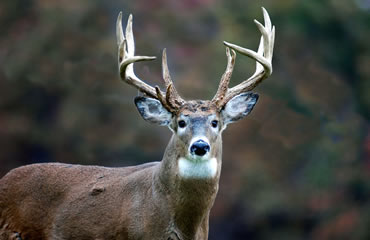
Smelling salts are "a preparation of carbonate of ammonia and scent for smelling, used as a restorative in cases of faintness or headache" (OED).
-
rubber
According to the OED, rubber refers to "A set of games (usually three or five), the last of which is played to decide between the opponents when each has won an equal number; (hence) the winning of more than half the individual games by one side" (OED).
This phrase altogether indicates that Lady Middleton was partaking in a card game upon hearing the news of Marianne.
-
indisposition
"Want of adaptation to some purpose, or to the circumstances of the case; unfitness, unsuitableness; incapacity, inability." (OED).
-
barouche
"A carriage with a half-head behind which can be raised or let down at pleasure, having a seat in front for the driver, and seats inside for two couples to sit facing each other" (OED).
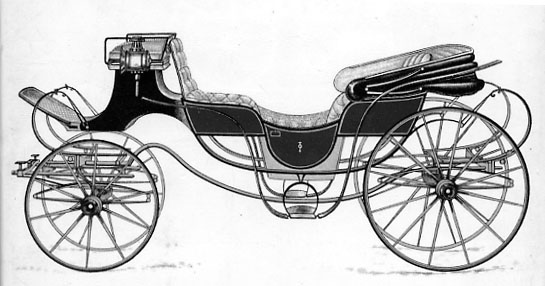
-
open weather
"With implied favourable qualification: Weather suitable for some purpose. Obs." (OED)
-
Law
An exclamation, usually denoting intense agitation.
-
two-penny post
"The London post (1801-1839) for conveyance of letters, etc. at an ordinary charge of twopence each" (OED).
-
the footman
"An attendant or foot servant; one employed to run ahead of or alongside a coach, carriage" (OED).
-
veal cutlets
"The flesh of a calf as an article of diet. A calf...as killed for food or intended for this purpose. Now rare. Chiefly in names of dishes. Made from veal, as veal pie, veal broth, veal cutlet, veal gravy" (OED).
-
-
annotatingausten.sfsuenglishdh.net annotatingausten.sfsuenglishdh.net
-
drawing-room
"A room reserved for reception of company, and to which the ladies withdraw from the dining-room after dinner" (OED).
The drawing-room had feminine decorations compared to the other rooms in a home; which included classically tasteful furnishings and musical instruments" (Drawing rooms, The Regency Town House).
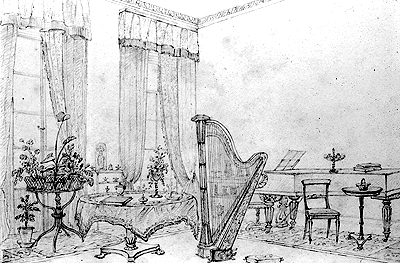
-
garrets
“A room on the uppermost floor of a house; an apartment formed either partially or wholly within the roof, an attic” (OED).
-
East Indies
"India and the adjacent regions of South-East Asia. In later use usually: the islands of South-East Asia, esp. the Malay Archipelago" (OED).
-
Cottage
A term used to designate a " small country residence... adapted to a moderate scale of living" (OED).
The image below is a still from the 1995 film adaptation of Sense and Sensibility showing the building used to represent Barton Cottage.

-
cousins
The term was used to identify distant relatives to a family (OED). In the chapter, Sir John recognizes the Dashwoods as distant relatives to his family.
-
pointers
"Any of several breeds of large gun dog which on scenting game, esp. birds, adopt a distinctive pose, standing rigid with the muzzle pointed towards the game, often with one foot raised; a dog of one of these breeds" (OED).
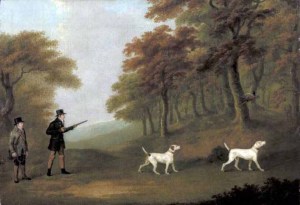
-
felicity
“Happiness; prosperity; blissfulness; blessedness” (Johnson).
-
smart
"Of a person: neatly or (relatively) formally dressed; appearing neat and stylish; tidy, well turned-out."(OED).
-
compass
- Someone or something that has a set of "boundaries and restrictions" (OED).
- "Space, room, or limits" (Johnson).
-
palanquins
"A covered conveyance, usually for one person, consisting of a large box carried on two horizontal poles by four or six (rarely two) bearers, used esp. in South, South-East, and East Asia" (OED).


-
saucy
"Of persons, their dispositions, actions, or language: Insolent towards superiors; presumptuous. Now chiefly colloq. with milder sense, applied to children and servants: Impertinent, rude, ‘cheeky’" (OED).
-
scanty
"Existing or present in small or insufficient quantity; not abundant" (OED).
-
rapturous
"Of a thing: characterized by or expressive of rapture" (OED). To be really delighted.
-
approbation
"The action of expressing oneself pleased or satisfied with anything; or the mere feeling of such satisfaction; approval expressed or entertained" (OED).
-
vivacity
"The state or condition of being vivacious" (OED). To be animated, lively.
-
-
annotatingausten.sfsuenglishdh.net annotatingausten.sfsuenglishdh.net
-
attentive
Attentive is defined here as heedful; regardful; full of attention. Affection can be described as passion of any kind, and it's followed by the third definition that reads "love, kindness, good-will to some person".
This definition is from the the 1775 Johnson Dictionary. This dictionary is the same one that Austen used, and this is why this would show the significance of the word "attentive" in this context.
-
melancholy
The first dictionary definition indicates that it is "a disease suppose to proceed from a rebundance of black bile." The second definition reads "a kindness of madness, in which the mind is always fixed on the object". We see this afflict Marianne throughout the duration of the novel, but the third recorded definition fits Colonel Brandon best: "A gloomy, pensive, discontented temper". This word was more frequently used as a noun, not an adjective.
-
Combe
"A short valley or hollow on a hillside or coastline, especially in southern England" (OED).
-
tea
"Tea is what the English refer to as "dinner"" (OED).
-
shewn
"Old-fashioned spelling of show" (OED).
-
-
annotatingausten.sfsuenglishdh.net annotatingausten.sfsuenglishdh.net
-
alacrity
"Liveliness, sprightliness; briskness, speed; cheerful readiness or willingness. Also: an instance of this" (OED).
-
consequences
"A round game, in which a narrative of the meeting of a lady and a gentleman, their conversation, and the ensuing ‘consequences’, is concocted by the contribution of a name or fact by each of the players, in ignorance of what has been contributed by the others" (OED).
-
veracity
"The quality or character in persons of speaking or stating the truth; habitual observance of the truth; truthfulness, veraciousness" (OED).
-
beaux
"The attendant or suitor of a lady; a lover, sweetheart"
(OED).
-
coxcomb
"A fool, simpleton (obs.); now, a foolish, conceited, showy person, vain of his accomplishments, appearance, or dress; a fop" (OED).
-
incumbent
"The holder of an ecclesiastical benefice" (OED).
-
poking
"To potter about; to move or work in a desultory, ineffective, or dawdling way" (OED).
-
monstrous
Meaning enormously.
-
scheme
"A plan; a combination of various things into one view, design, or purpose; a system" (Johnson).
-
chaise
Short for 'post-chaise', defined as ""a horse-drawn, usually four-wheeled carriage (in Britain usually having a closed body, the driver or postilion riding on one of the horses) used for carrying mail and passengers, esp. in the 18th and early 19th centuries"" (OED).
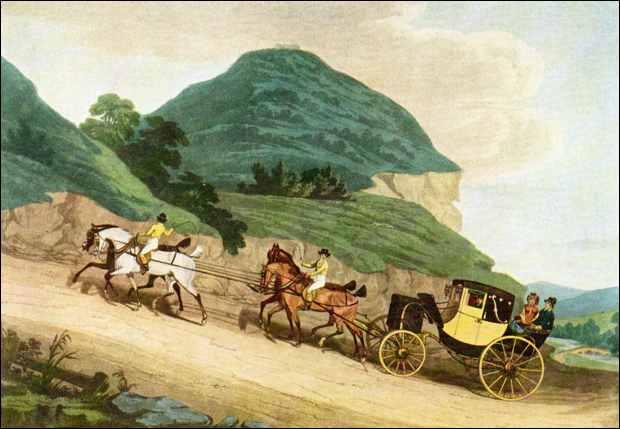
-
complexion
"Constitution or habit of mind, disposition, temperament; ‘nature’" (OED).
-
in raptures
A state, condition, or fit of intense delight or enthusiasm (OED).
-
Their dress was very smart
Fashionable, elegant, sophisticated; belonging to or associated with fashionable or high society (OED).
-
ungenteel
For persons, not "genteel"; of manners, habits, employments, etc. (OED).
-
fashion
In depreciatory sense, after, in, a or some fashion: somehow or another, in a sort, tolerably, not too well (OED).
-
éclat
Brilliancy, radiance, dazzling effect (in lit. sense or with conscious metaphor) (OED).
-
-
annotatingausten.sfsuenglishdh.net annotatingausten.sfsuenglishdh.net
-
gentility
"Gentle birth; honourable extraction; the fact of belonging to a family of gentle blood. Also, the personality of one who is well-born" (OED).
-
subjection
"The action, state, or process of being submissive or subject to another; submission, obedience; homage" (OED).
-
maxim
“A rule or principle of conduct” (OED).
-
annuities
"A yearly grant, allowance, or income" (OED).
-
competence
“A sufficiency of means for living comfortably; a comfortable living or estate” (OED).
-
assurance
Lack of self-confidence (OED).
-
liberality
“The quality of being open-minded and free from prejudice; liberal-mindedness” (OED).
-
banditti
“One who is proscribed or outlawed; hence, a lawless desperate marauder, a brigand” (OED).
-
genteel
"Belonging to or included among the gentry; of a rank above the commonalty" (OED).
-
environs
"A surrounding area or district" (OED).
-
raillery
"Good-humoured ridicule or banter, often disguising a serious purpose; teasing, mockery" (OED).
-
hackneyed
"Made trite, uninteresting, or commonplace through familiarity or overuse; stale, tired; banal" (OED).
-
picturesque
"A term expressive of that peculiar kind of beauty, which is agreeable in a picture" (William Gilpin, Essay on Prints, xii). It is a term of the Romantic movement, believed to have been coined by Rev. William Gilpin, which seeks to brings together two paradigms, that of beauty and the sublime, in order to create one aesthetic ideal. The picturesque can be utilized to describe both architecture, such as Sotherton in Mansfield Park, or landscape in the way that Gilpin does in his travel books.
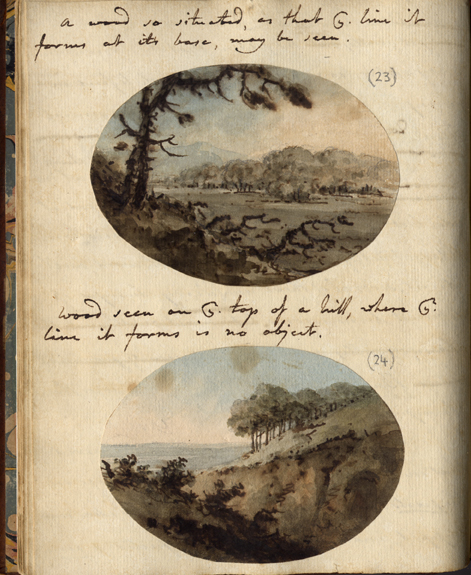 (William Gilpin, From Observations Chiefly Made to Picturesque Beauty)
(William Gilpin, From Observations Chiefly Made to Picturesque Beauty) -
controuled
Both in the verb and the noun, the form Controul was very frequent from the 17th to the early 19th century (OED).
-
effusions
"The shedding of tears" (OED).
-
-
annotatingausten.sfsuenglishdh.net annotatingausten.sfsuenglishdh.net
-
connoisseur
"A person well acquainted with one of the fine arts, and competent to pass a judgement in relation thereto; a critical judge of art or of matters of taste" (OED).
-
barouche
"A four-wheeled carriage with a half-head behind which can be raised or let down at pleasure, having a seat in front for the driver, and seats inside for two couples to sit facing each other."(OED). "Aristocratic vehicle, for dress occasions, mainly used in town"(Janeite Deb, Jane Austen In Vermont, Travel in Sense & Sensibility~Part IV~Carriages, cont'd, Web)
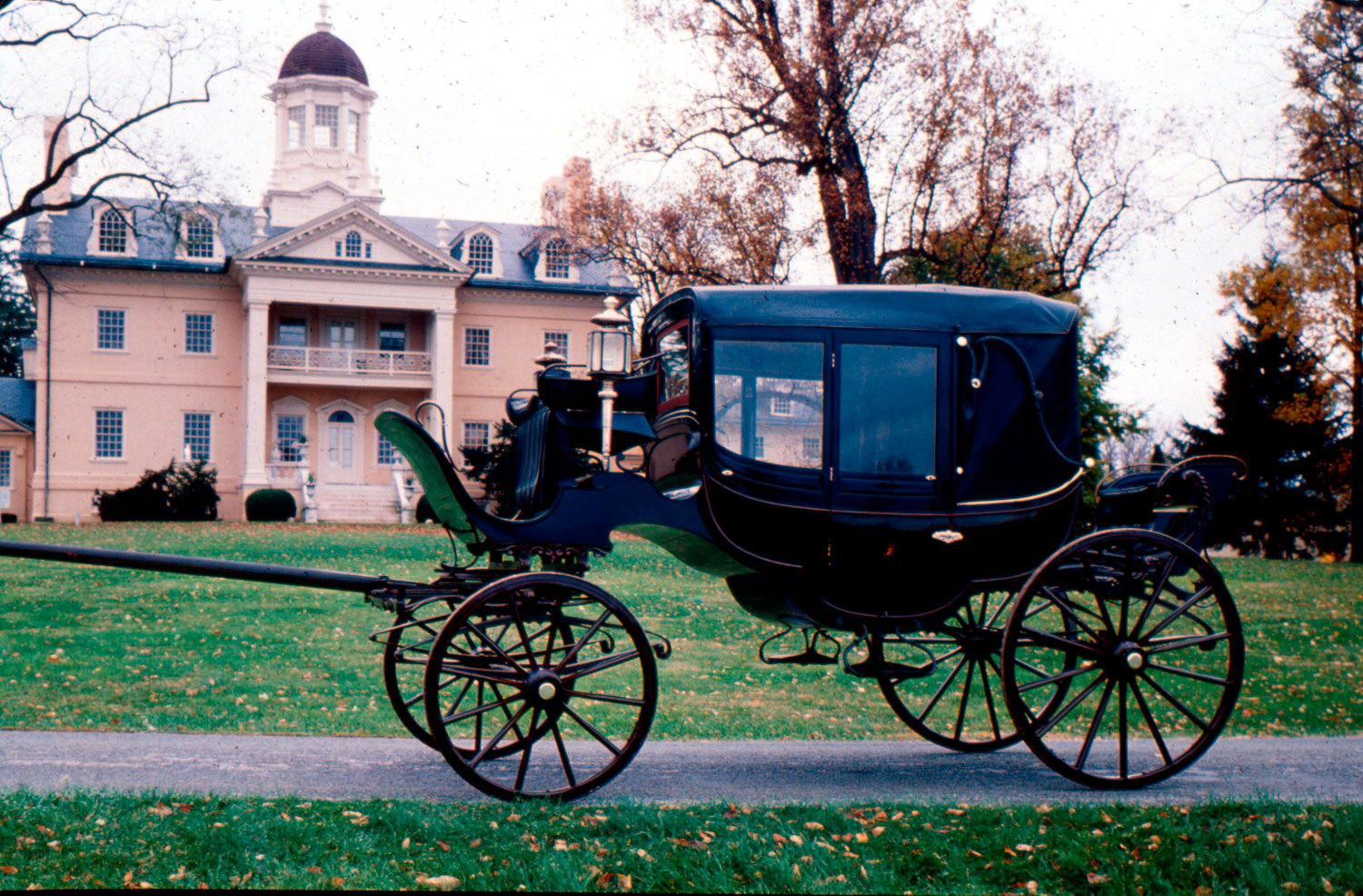
-
asunder
"In or into a position apart or separate; apart" (OED).
-
abilities
Abilities used here to describe: "mental power or capacity; cleverness, astuteness. In later use also: academic aptitude" (OED).
-
moiety
"A half, one of two equal parts." (OED)
Used here to explain that the father has half the control of the fortune while the son will inherit the other half when he comes of age.
-
sensibility
"The quality of being readily and strongly affected by emotional or artistic influences and experiences; emotional awareness; susceptibility or sensitivity to, keen awareness of" (OED).
-
sense of honour
“Quality of character entitling a person to great respect; nobility of mind or spirit; honourableness, uprightness; a fine sense of, and strict adherence to, what is considered to be morally right or just" (OED).
-
taste
In this scene, taste is used to mean the "condition of liking or preferring something; inclination, liking for; appreciation" as well as "enjoyment, pleasure, relish" (OED).
-
- Apr 2017
-
annotatingausten.sfsuenglishdh.net annotatingausten.sfsuenglishdh.net
-
canvass
"To solicit votes or support previously to an election" (OED).
-
frank
"To superscribe (a letter, etc.) with a signature, so as to ensure its being sent without charge" (OED). According to The History of the British Post Office, franking was a privilege that allowed sending letters without being charged. However, over time, this privilege was highly abused and ultimately by 1840 this privilege was finally abolished. Franking free letters for others not in Parliament and for non Parliament purposes was so serious a Franking Department was created to inspect such letter (Hemmeon, The History of the British Post Office, p. 57).
-
casement
"A window that opens like a door" (OED).
-
abstruse
"Difficult... opposite of obvious and easy" (OED).
-
fettered
"To bind; to enchain; to tie" (OED).
-
disposition
"temper of mind," (OED).
-
cross
"In an adverse or unfavorable way; contrary to one's desire or liking; awry, amiss" (OED).
-
droll
"Intentionally facetious, amusing, comical, funny; a funny or waggish fellow, a merry-andrew, buffoon, jester, humorist" (OED).
-
smart
"Smart" here meaning fashionable or trendy. The church isn't fashionable enough for Edward's family, but the army is too much so for him.
-
-
annotatingausten.sfsuenglishdh.net annotatingausten.sfsuenglishdh.net
-
flannel waistcoats
"A garment forming part of ordinary male attire, worn under an outer garment (a doublet, later a coat, jacket, or the like), and intended to be partly exposed to view when in wear" (OED).
Flannel Waistcoat: "Usually of knitted wool, worn chiefly for additional warmth" (OED).

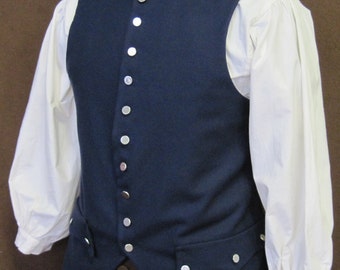
-
fortune small
"Amount of wealth; a person's possessions collectively, wealth, one possessing great (usually inherited) wealth. Also a stock of wealth, accumulated by an individual or received by inheritance, as a marriage portion, etc.; ordinarily implying a somewhat ample amount" (OED).
In this sense it is someone who has an amount of money that isn’t overly large or overly small.
-
infirmity
"A special form or variety of bodily (or mental) weakness; an illness, disease, a failing in one or other of the faculties or senses" (OED).
-
jointure.
"A sole estate limited to the wife, being a competent livelihood of freehold for the wife of lands and tenements, to take effect upon the death of the husband for the life of the wife at least" (OED).
-
garden
“A piece of ground adjoining a building (esp. a private property), often with grass, flowers, trees, etc., and generally used for recreation” (OED).
-
sick chamber
"A room designated for ill occupants" (OED).
-
invariable
"Changeable, unalterable; remaining ever the same, unchanging, constant; occurring alike in every case, unvarying" (OED).
-
languid
"Of a person, a person's character, actions, emotions, not easily inspired to emotion, exhibiting only faint interest or concern; spiritless, indifferent, apathetic" (OED).
-
grate
"A frame of metal bars for holding the fuel in a fireplace or furnace. Hence, the fireplace itself" (OED).
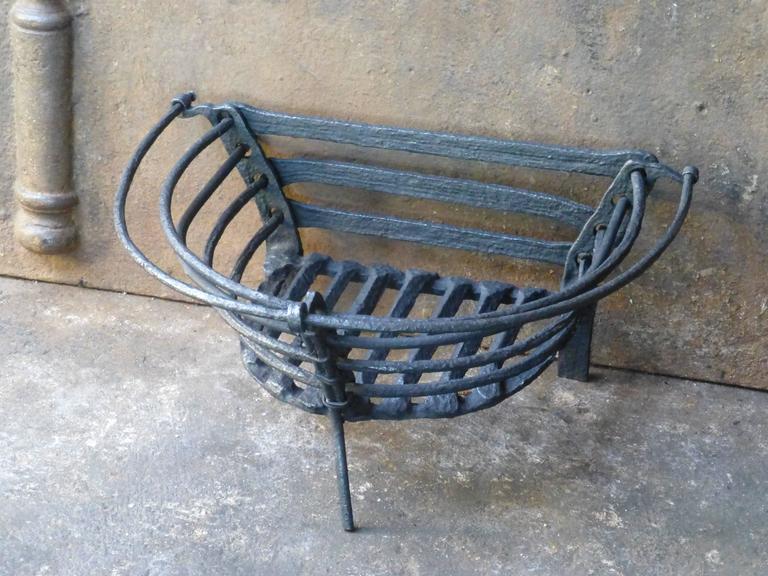
-
indisposition
"The state of not being mentally disposed, or ‘in the mind’ (to something, or to do something); disinclination, unwillingness" (OED).
-
fortnight
"A period of fourteen nights; two weeks" (OED).
-
compact of convenience
"A marriage contract of convenience rather then love" (OED).
-
matrimony.
"A marriage; an act of getting married. Also: a union or alliance formed by marriage" (OED).
-
animated
"Full of the activity and movement of life, enlivened; spirited, lively, vivacious" (OED).
-
Park
"A house or mansion having extensive ornamental grounds. Usually in the names of estates" (OED).
-
nabobs
"In extended use: a wealthy, influential, or powerful landowner or other person, esp. one with an extravagantly luxurious lifestyle; spec. (now hist.) a British person who acquired a large fortune in India during the period of British rule. Also: any wealthy or high-ranking foreigner (rare)" (OED).
-
ascertained
"Determined, fixed" (OED).
-
-
annotatingausten.sfsuenglishdh.net annotatingausten.sfsuenglishdh.net
-
bely
"To deceive by lying, or to tell a lie" (OED).
-
-
annotatingausten.sfsuenglishdh.net annotatingausten.sfsuenglishdh.net
-
incommode
Described as "to subject to inconvenience or discomfort; to trouble, annoy, molest, embarrass, inconvenience."
This word was most popularly used in England between 1690 and 1760, but became uncommon by the 1950s. (OED)
-
propensities
The OED defines propensity as a "favourable inclination or disposition towards a person, party, etc.; partiality; goodwill; an instance of this. Now rare."
The word began appearing in the English language in the early 17th Century, and was used most frequently in the late 18th Century and early 19th Century. Usage plummeted in the early 20th Century and now appears very rarely in common-day English.
-
-
annotatingausten.sfsuenglishdh.net annotatingausten.sfsuenglishdh.net
-
natural daughter
A daughter born out of wedlock.
-